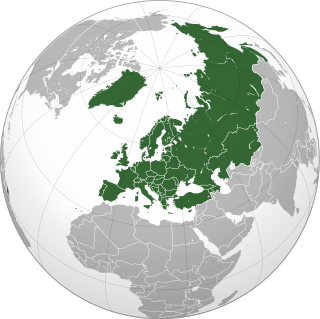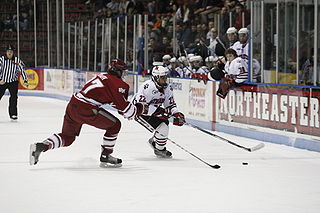Six Nations may refer to:
Six Nations may refer to:

Bandy is a winter sport and ball sport played by two teams wearing ice skates on a large ice surface while using sticks to direct a ball into the opposing team's goal.

Ice hockey is a team sport played on ice skates, usually on an ice skating rink with lines and markings specific to the sport. It belongs to a family of sports called hockey. Two opposing teams use ice hockey sticks to control, advance, and shoot a vulcanized rubber hockey puck into the other team's net. Each goal is worth one point. The team with the highest score after an hour of playing time is declared the winner; ties are broken in overtime or a shootout. In a formal game, each team has six skaters on the ice at a time, barring any penalties, including a goaltender. It is a full contact game and one of the more physically demanding team sports.

Lacrosse is a contact team sport played with a lacrosse stick and a lacrosse ball. It is the oldest organized sport in North America, with its origins with the indigenous people of North America as early as the 12th century. The game was extensively modified by European colonists, reducing the violence, to create its current collegiate and professional form.

The World Cup of Hockey is an international ice hockey tournament. Inaugurated in 1996, it is the successor to the Canada Cup, which was held every three to five years from 1976 to 1991 and was the first international hockey championship to allow nations to field their top players. The World Cup has occurred thrice before on an irregular basis, with the United States winning in 1996 and Canada winning in 2004 and 2016. Following the 2016 tournament, it was uncertain if the series would be continued, after the cancellation of the 2020 tournament. It is tentatively scheduled to be held every four years, starting in 2028.

A European Championship is the top level international sports competition between European athletes or sports teams representing their respective countries or professional sports clubs.
The annual NCAA women's ice hockey tournament—officially known as the National Collegiate Women's Ice Hockey Championship—is a college ice hockey tournament held in the United States by the National Collegiate Athletic Association to determine the top women's team in the NCAA.

NCAA Division I (D-I) is the highest level of intercollegiate athletics sanctioned by the National Collegiate Athletic Association (NCAA) in the United States, which accepts players globally. D-I schools include the major collegiate athletic powers, with large budgets, more elaborate facilities and more athletic scholarships than Division II and Division III as well as many smaller schools committed to the highest level of intercollegiate competition.

The IIHF World Women's Championship, officially the IIHF Ice Hockey Women's World Championship, is the premier international tournament in women's ice hockey. It is governed by the International Ice Hockey Federation (IIHF).
Champions Cup may refer to one of many sports competitions:
Sport is considered a national pastime in Finland and many Finns visit different sporting events regularly. Pesäpallo is the national sport of Finland, although the most popular forms of sport in terms of television viewers and media coverage are ice hockey and Formula One. In spectator attendance, harness racing comes right after ice hockey in popularity.
Four Nations may refer to the following articles:

College ice hockey is played principally in the United States and Canada, though leagues exist outside North America.

The Western Collegiate Hockey Association is a college athletic conference which operates in the Midwestern United States. It participates as a women's ice hockey conference in the NCAA's National Collegiate division, the de facto equivalent of Division I in that sport. Founded in 1951 as a men's ice hockey conference, it added a women's division in 1999, and continued to operate men's and women's divisions through the 2020–21 hockey season. After that season, the WCHA disbanded its men's division after seven of its 10 men's members left the conference to reestablish the Central Collegiate Hockey Association; the WCHA remained in operation as a women-only league. Each team plays 28 league games, each team playing four games against every other, two home games and two road games.

Sport in Europe tends to be highly organized with many sports having professional leagues. The origins of many of the world's most popular sports today lie in the codification of many traditional games, especially in the United Kingdom. However, a paradoxical feature of European sport is the extent to which local, regional and national variations continue to exist, and even in some instances to predominate.
The Challenge Cup is a British rugby league competition held annually since 1896.

The IIHF Women's World U18 Championship, officially the IIHF Ice Hockey U18 Women's World Championship, is an annual ice hockey tournament for national women's under-18 (U18) ice hockey teams, administered by the International Ice Hockey Federation (IIHF). It is the junior edition of the IIHF Women's World Championship and participation is limited to female ice hockey players under 18 years of age.
Nations Cup may refer to:
The following is a list of women's college ice hockey programs (teams) that participate in Division I ice hockey of the National Collegiate Athletic Association (NCAA) and compete for berths in the annual National Collegiate Women's Ice Hockey Championship. Programs (teams) are sorted by the conferences in which they play.

The annual NCAA Division I Men's Ice Hockey Tournament is a college ice hockey tournament held in the United States by the National Collegiate Athletic Association (NCAA) to determine the top men's team in Division I. Like other Division I championships, it is the highest level of NCAA men's hockey competition. This tournament is somewhat unique among NCAA sports as many schools which otherwise compete in Division II or Division III compete in Division I for hockey.